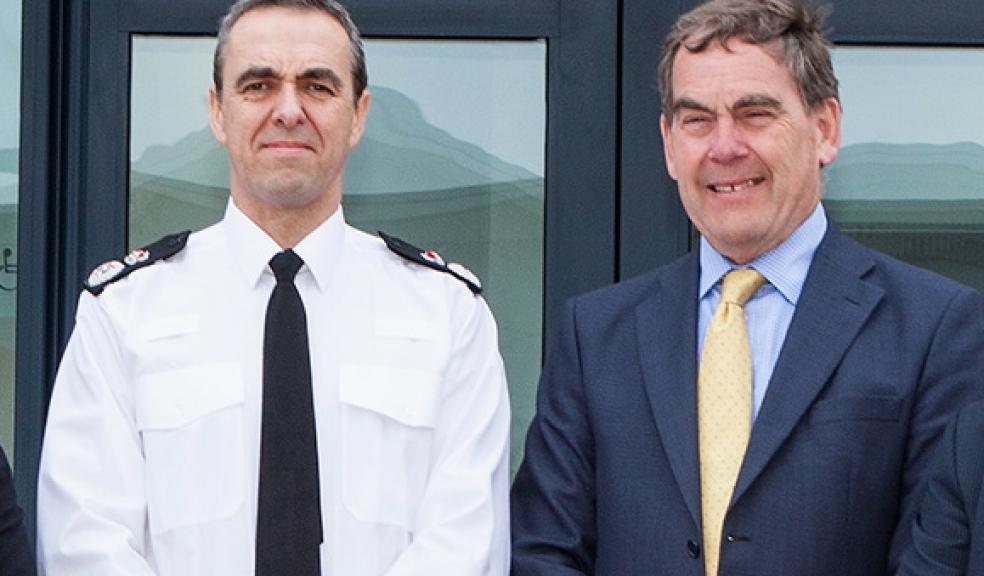
Devon and Cornwall's police chiefs call for MPs to back a better deal for the region
Devon and Cornwall's Police and Crime Commissioner (PCC) and Chief Constable have written to all of Devon and Cornwall's MPs as the Chancellor George Osborne sets out his plans for further departmental spending cuts today.
In a letter released publicly, PCC Tony Hogg and Chief Constable Shaun Sawyer call for local MPs - including Plymouth's Oliver Colvile (Plymouth Sutton and Devonport), Alison Seabeck (Plymouth Moor View) and Gary Streeter (South West Devon) - to support them "in influencing the Home Office and government thinking in respect of the police budget grant provision and how this affects all forces, but particularly Devon and Cornwall."
The text of the letter follows in full:
"To Devon and Cornwall MPs
"We write to enlist your support for policing in Devon, Cornwall and the Isles of Scilly in advance of government announcements on future spending reviews. We watch with keen interest as non-ring fenced departments marshal their arguments against further cuts and we feel increasingly uneasy as we consider the implications for local policing, community safety and our current improvement projects to prevent further reductions in police officer numbers.
"Her Majesty's Inspector of Constabulary accepts that Devon and Cornwall entered the last spending review round having already delivered significant cash efficiency savings of £18.1m in the previous three years. They also accepted, therefore, that it was harder to deliver the current government savings remit of a further £50m from our annual average budget of £285m over the four years 2011-15. Devon and Cornwall have subsequently been criticised for having to cut officer numbers and take measures such as retirement for officers with over 30 years service (A19), over 300 redundancies and the closure of police stations, which means to date we are ahead of the required savings profile.
"The 2011-15 savings target above, predicted a downward 'glide slope' of officer numbers from 3,500 to 2,810 over the years to 2015. The current CSR is not a temporary phase, with public spending reduction already extended by three or four further years. Even without further cuts that are likely in the next CSR announcement we know that over the next four years (to March 2017) we will need to find a further £36m of savings to meet targets and keep police officer numbers stable.
"Mindful of our need to respond to public emergencies, conduct investigations and meet our national policing requirements, the resulting number of officers available for neighbourhood policing – the bedrock of policing intelligence and community safety and engagement– is already at a critical level across Devon, Cornwall and the Isles of Scilly. Through an increase in the precept and careful budgeting, we have managed to stop the decline in police officer numbers this financial year at 3,090 and to restart recruiting. The budget, discounting further cuts and increased costs of £5m per annum through pension reforms, provides a sustainable position on police numbers. It also provides for desperately needed investment in training and technology advances, and maintains the visibility of police officers at a minimum but acceptable level given national economic pressures. We are acutely focused on maintaining this level across the CSR period.
"Adding to the risk factors is the influx of some 8 million visitors in the summer months, a significant increase on our population of 1.7 million people. The rural nature of much of Devon and Cornwall, relatively high deprivation levels, concurrent demands such as the national requirements to police the G8 summit and the increased complexity of policing adds further stresses upon the Force. The current police 'funding formula' fails to fully acknowledge all of these factors. Whilst such funding is under government review, we are most concerned that it will again be the large and urban Forces who will dominate the debate, yet it is often those Forces that are already in receipt of additional funding streams.
"We urgently need to harness your support at this time but realise we can only justify your support if we satisfy you regarding scrutiny over our levels of efficiency and effectiveness.
"We have a long history of delivering savings with £40.6m saved since 2010/11 and, as examples of further savings to 2017, we are rationalising the estates footprint by 5%, collaborated regional procurement is set to deliver £0.8m, information technology will produce savings of £1.2m with more anticipated through outsourcing, and over £0.5m has been removed from police overtime budgets.
"Having worked so hard to deliver a sustainable policing plan we are deeply concerned that a disproportionate approach to the police budget, and in particular a one-size fits all approach to the allocation of cuts through the Home Office, creates a real threat to the provision of policing services within the peninsular. Further savings which impact upon neighbourhood policing will result in strong public dissatisfaction and real damage to our fundamental prevention, early intervention and safeguarding projects within neighbourhood policing work and spend to save investment in technology.
"From the PCC’s perspective I would like to ask you to argue for the removal of the precept capping of police forces in England. We currently have a police service for England and Wales but those in Wales are not capped.
"In the meantime, anticipating that we will all be held to account by the public and the press we are asking you, our 18 MPs, to consider combining your influence to support us in influencing the Home Office and government thinking in respect of the police budget grant provision and how this affects all forces, but particularly Devon and Cornwall. We feel we should be facing this challenge together and we look forward to your response."
Listen to PCC Tony Hogg's audio interview under our 'Videos' section to the right of the screen.














